Sunday Feb 15, 2026
Sunday Feb 15, 2026
Saturday, 30 October 2021 00:00 - - {{hitsCtrl.values.hits}}
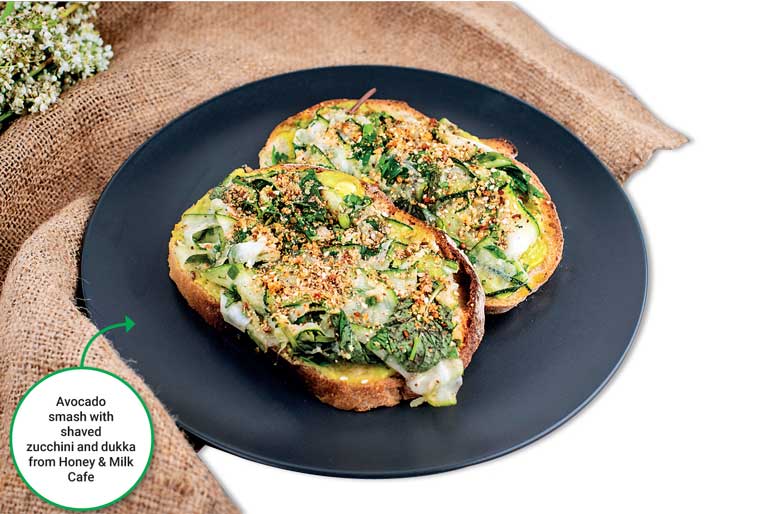
|
 Shifting our food systems and eating habits towards more plant-based diets has many potential benefits. Plant-based diets can improve individual and public health, use less resources, help to address climate change, and enhance animal welfare. Fortunately, Sri Lanka has many cooking, dining, and delivery options for plant-based food, from the traditional to modern fusion cuisine and from native fruits and vegetables to animal substitute ingredients.
Shifting our food systems and eating habits towards more plant-based diets has many potential benefits. Plant-based diets can improve individual and public health, use less resources, help to address climate change, and enhance animal welfare. Fortunately, Sri Lanka has many cooking, dining, and delivery options for plant-based food, from the traditional to modern fusion cuisine and from native fruits and vegetables to animal substitute ingredients.
In the first part of this column (https://www.ft.lk/columns/Eating-green-and-clean-in-Colombo/4-724480), a range of plant-based food options around Colombo was outlined and different restaurants highlighted for their inventive dishes ranging from vegan lamprais to mushroom kottu, vegetarian sandwiches to vegan noodles, and seitan Bolognese to soya milk cappuccinos. This week will explore further options in honour of the upcoming World Vegan Day, which is celebrated around the world on 1 November.
Celebrating Vegan and Vegetarian Month
When it comes to plant-based diets, October and November are significant months. This Monday, 1 November, will mark World Vegan Day 2021, the beginning of Vegan Month, and the end of Vegetarian Awareness Month. Vegetarian Awareness Month starts with World Vegetarian Day on 1 October, runs through the whole of October, and contains other significant occasions such as World Food Day on 16 October.
Both World Vegetarian and Vegan Day as well as the months following them provide ample opportunities for people to reflect on the benefits of plant-based diets and explore new and exciting options in their own kitchen, their hometowns, and across the country. This is a chance to experiment, to try something new, and to inform oneself about what is available.
Different aspect of plant-based, ethical diets can be highlighted on World Vegan Day, for example by sharing recipes or good experiences at food outlets, cooking a completely plant-based meal, or reflecting on one’s own diet. Many restaurants are introducing special items to their menus as part of World Vegan Day celebrations, highlighting the breadth and depth of plant-based food options. Other activities include cooking demonstrations and cookery classes, video interviews and promotions, social media campaigns, or restaurant reviews.
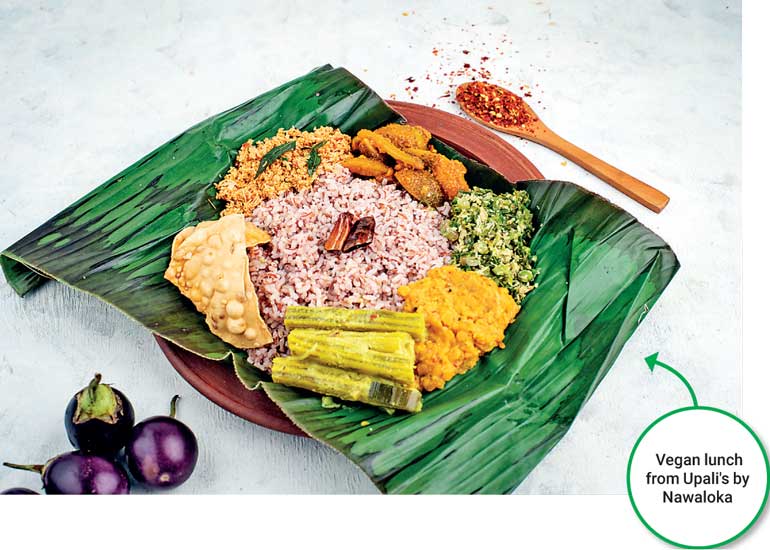
Plant-based food choices
The following section will take a deeper dive into the wealth of delicious plant-based food options available in Sri Lanka. It builds on the previous column, which already featured Hela Bojun, Ranbath Organics, Lamprais by Shey, The Vegan, Sulo’s Vegan Kitchen, Mount Lavinia Hotel, Tea Avenue, Dolce Italia, Natural Eats, Good Market, Nuga Café, Smokey’s Café, Isle of Gelato, Milk & Honey Café, Fit Sugar, Bombay Sweet House, and Bombay Sweet Centre.
While this is a long list, it only provides a few of many possible examples. Sri Lanka has a wealth of diverse food options which are plant-based, ethical, sustainable, and climate-friendly, with plant-based meals to be found for every taste. Whether it is avocado smash with shaved zucchini and dukka from Honey & Milk Café or pumpkin pancakes from Lucuma Vegan Cafe, whether it is a berry smoothie bowl from Cafe Nuga or Kombucha (ginger, turmeric, beli mal) from Laa Dhalu: there are almost unlimited options for foods and drinks made from strictly plant-based ingredients.
Vegetarian and vegan food options are of course not restricted to main meals at lunch- or dinnertime, but can also serve as breakfast, snacks, desserts, drinks, or other offerings such as vegan protein shakes made from oats and cocoa, energy drinks, almond butter, cashew butter, and energy balls, all of which are available at Inaari Veganised.
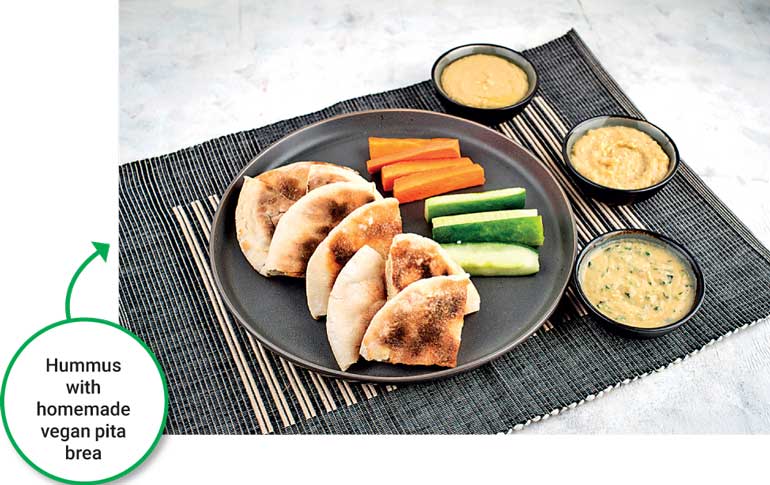
When it comes to traditional Sri Lankan food, Upali’s by Nawaloka presents a culinary experience with a wide range of Sri Lankan delicacies. The menu at Upali’s clearly marks food options as vegetarian or vegan, and even highlights foods that have a vegetarian or vegan option readily available. As just one example, the Set Menu (Kehelkole) is served in a banana leaf and contains red rice, bitter gourd curry, dhal curry, drumstick curry, tempered coconut sambol, leafy greens, papadam, and roasted chili pods. This lunch is seasoned with local spices and presents an authentic, completely plant-based Sri Lankan experience with a great variety of tastes and textures.
Without going to a restaurant, there are also now several options to have freshly cooked, plant-based meals delivered right to one’s doorstep. Kemara, for instance, provides different meals and meal plans with vegan and non-vegan options for every weekday, including breakfast, lunch, dinner, and even in-between snacks. Also among Kemara’s offers are desserts that are sugar-, gluten-, grain-, and dairy-free, such as mini blueberry tarts and love cake, and a range of organic crisps, including the mixed root vegetable medley.
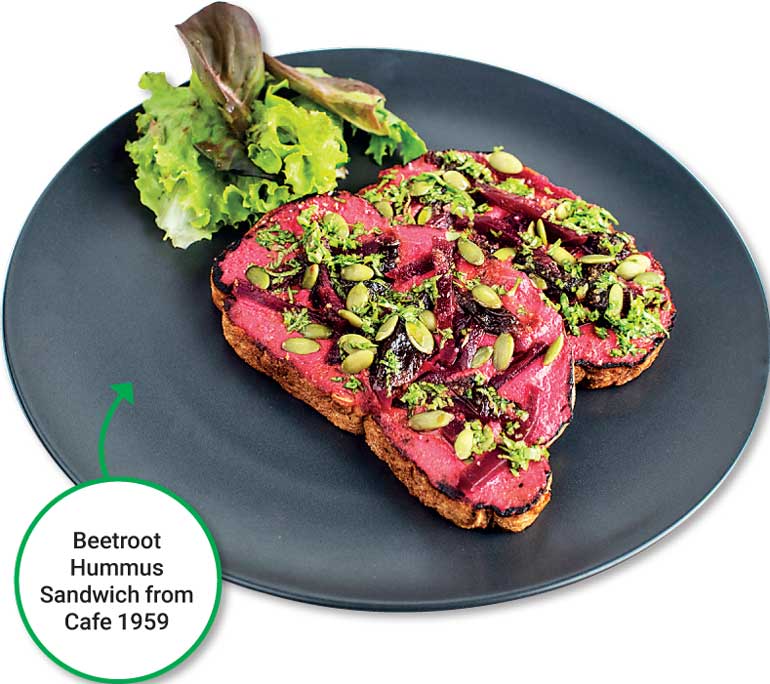
Another example of a plant-based food option is hummus, which is traditionally made from mashed chickpeas blended with tahini, lemon juice, and garlic, and can be used as a dish, a dip, or a spread in various ways. This can include a serving of hummus with vegan pita bread, as offered by The Social, Colombo, or innovative and imaginative creations such as the beetroot hummus sandwich available at Café 1959, a coffeehouse serving a range of coffees, desserts, and small dishes.
For desserts, gelato can serve as a refreshing vegetarian option in addition to fruits and traditional sweets. Cremalato, for example, offers popsicles in a range of different tastes including ambarella, pomegranate, mango, strawberry, passion fruit, avocado, watermelon, lime-coconut, or Jammu/sweet Narang that all have a strong, authentic fruit taste. In addition, Cremalato also has completely dairy-free, vegan Narang and mint sorbet on its menu, leaving little to be desired in terms of fruit-based gelato. Moreover, while many restaurants and eateries have taken up delivery during the COVID-19 pandemic, there are few delivery options for ice cream – Cremalato is one of them.
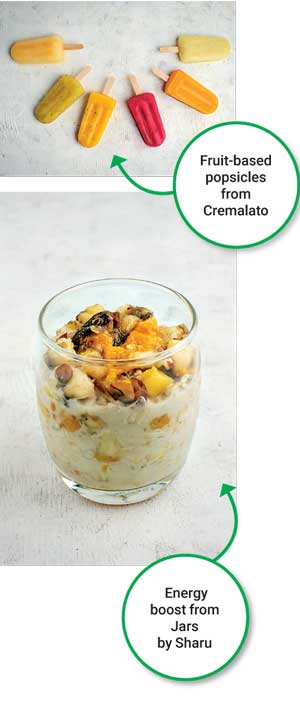 Ethical and sustainable aspects of food choices
Ethical and sustainable aspects of food choices
Sustainable consumption is not only about eating food that is healthy and plant-based, but also includes aspects such as local supply chains, resource-efficient production and transport, and packaging. One place that tries to address plastic pollution is Jars by ShaRu, which uses eco-friendly packaging and reusable containers for their jars filled with superfoods, fruits, and nuts, such as the “energy boost” or the “pina colada” with pineapple and coconut milk.
Similarly, there are many other vegetarian- and vegan-friendly food outlets that are incorporating other aspects of sustainable lifestyles into their menu, for example Inaari Veganised with its glass bottles and jars that are collected after usage for recycling. In this sense, World Vegan Day can also bring to the forefront other themes and topics connected to protecting the environment, the climate, and the wellbeing of animals. Reducing waste and reusing or recycling products can make a huge difference when it comes to environmental pollution both on land and in the oceans.
Celebrating World Vegan Day
Food choices are important for our daily lives, health, and wellbeing, as well as the wellbeing of animals, the environment, and the planet. Plant-based food can not only help to strengthen all of these aspects, but they can also be tasty, unique, diverse, and fulfilling experiences for vegans and non-vegans alike.
In celebrating World Vegan Day, we can explore ways to eat and consume in a more sustainable, ethical, and nature-friendly way: through cooking meals without meat, visiting restaurants with plant-based menus and menu options, or by supporting small businesses and ethical entrepreneurs who provide alternatives to unsustainable foods, packaging, and other products.
Pix courtesy SLYCAN Trust
(The writer works as Director – Research & Knowledge Management at SLYCAN Trust, a non-profit think tank based in Sri Lanka. His work focuses on climate change, adaptation, resilience, ecosystem conservation, just transition, human mobility, and a range of related issues. He holds a Master’s degree in Education from the University of Cologne, Germany and is a regular writer to several international and local media outlets.)